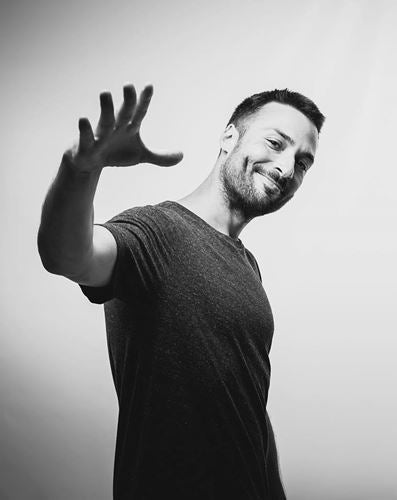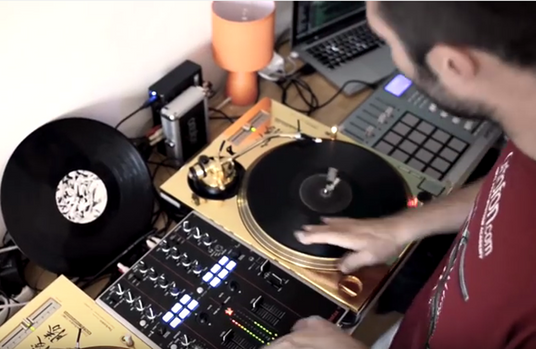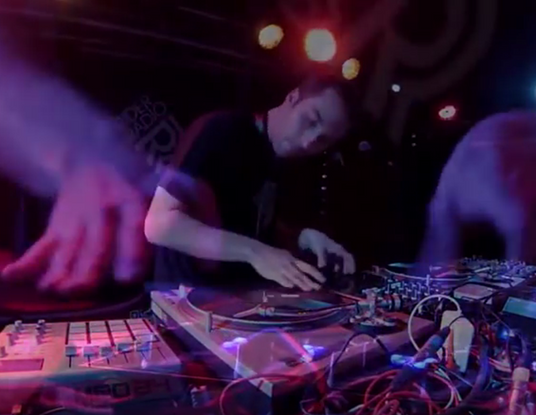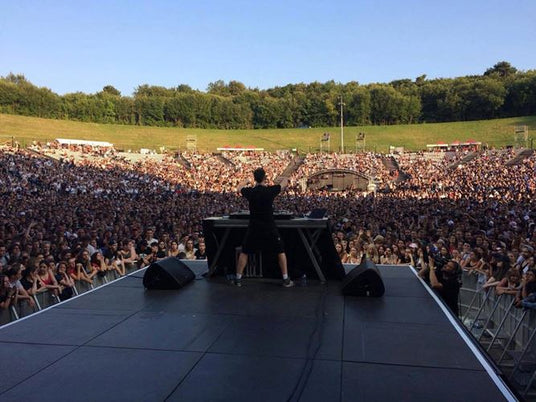
DJ NETIK - a living legend of turntablism
DJ ND had the chance to meet DJ NETIK. Close up on this multiple world champ, open-minded DJ and down to earth guy.

DJ ND: How did it start for you? Did you directly started as a DJ? What is your background?
- I’m a music lover. I started playing the guitar back in 1995-1996. At the same time, I shared a passion for rap music and hip hop with a close friend. We were listening to mixtapes, watching video clips. At some point my friend bought a turntable and we started experimenting … Trying to remake the cuts we heard in famous rap songs … I was also in contact with my elder sister's friends who were spinning electronical music. That’s how it all started.
When did you enter your first competition?
- In 1997-1998. Vestax was launching a lot of new products. I couldn’t afford buying one as I was only a teenager back then. So I went to the MixMove, a music fair in Paris. On the Vestax stand, there was a scratch competition. First price was a Vestax 06 mixer. So I entered the battle … and I won. It was the beginning of a long journey into the battle world.

What happened then?
- Well, I continued to practice and I entered my very first DMC in 2001. I won the French Finals, went to the worlds, and before I even realized, I reached the finals in London, where I took my first world title. I defended in 2002 and won again … And I just kept going. I entered ITF, all Star Beatdown, and I continued winning titles. I lost a few times also, of course, but I have to say that most of the time, things went very well for me.
Beside your aggressive but very musical style, you seem always very well-prepared and very strong mentally …
- If it’s the image I give, than I’m glad. Actually, I’m very anxious before battles. The only way to evacuate the pressure for me is to practice … I’m putting myself in a bubble, and I just do my thing, over and over again. By doing so, I can feel self-confidence growing a bit. But still … It’s stressful. Good preparation before battles has always been the solution for me to avoid stress and troubles and to keep cool on the day of the competition.

After a few years off, you came back like a fireball in 2006 with a routine produced by Lejad. The production work blew everybody away. Was this the beginning of a new era? A restart of turntablism?
- LeJad was already working with Ordoeuvre (another French turntablist). LeJad is an artist that had a vision. He was thinking of new ways to step our game up and give turntablism a new start. Where most of the DJs were using hip hop sounds or Drum’n’Bass, we came with hardcore electronic sounds, and it really became a trend for a couple of years. Everybody started producing their showcases from scratch.
Turntablism was entering a new artistic dimension, confirmed later on with the introduction of DVS in competitions.

Did this create a gap between turntablists and main stream crowds?
Looking back now, it certainly did! But in this mid-2000s era, turntablism was not as exciting as it used to be. Things were a bit boring and we needed something fresh! This new approach has given a new start in the artistic aspect we brought. It was a step forward for the scene, but on the other side, the art of turntablism disconnected a bit from its roots, which is deejaying, using songs that already exist. The process until then was more like: "Hey, look how I flip this tune with turntables". So yes, for the main stream music lover, the routines we were making began to be less accessible. Nowadays, the scene has stepped back a little bit from this produced routines ... but tablists can now use best of both worlds. Edited routines and famous songs flipped. I think Dj Skillz's 2018 DMC World Winning routine is a good example of this.

Is portablism coming back?
- There are way more scratch DJs and bedroom DJs than there have ever been before. And especially because of portablism, which is a very cool thing! It‘s funny because for the average people Scratching is not so "cool" than it used to be in the late 90s. It’s not seen anymore as a super cool discipline (or not as it used to be). On the other hand, there are way more scratchers now than back in the 90s.
In nowadays competitions, we see a revival of older beat-juggling technics, body tricks. How do you explain that?
- As i said before, in the past years, the battle scene came back to its roots. I think it was needed, cause we went far with the produced routines, so naturally the scene stepped back. It's a cycle. Seeing beatjuggling on famous songs again also means that turntablism connected back with the deejaying aspect. But, you know, trends come and go, and turntablism is not an exception for that. The culture continues to live and evolve. It’s all good.

Today, there are so many disciplines on the DJ scene. You have club DJs, turntablists, portablists, the Thre3style DJs … How do you see this and where would you place yourself?
Well, this is my main preocupation at the moment! After 2 years of touring with DJ Fly, I took a step back to reflect on the evolution of my career. There are so many possibilities, as you said ... So it‘s very important to make choices that really fit what I want to bring. As a DJ, I recently spent most of my time listening to new music. In order to find out what I want to play in the future, what can fit to my personal vibz, which scene I want to represent, etc. A kind of to sort it out. So I'm still a DJ, but I'm trying to bring my own vibes, I don't want to be that average DJ playing Top40 tracks (with all respect). I prefere to emphasize a personal vibe in deejaying rather than being the "I'm-gonna-play-what-you-want" DJ. On the other hand, I‘m still a turntablist, no doubt about that. I still love scratching, still practice a lot, and still contribute to the scene, cause that‘s what I love!
